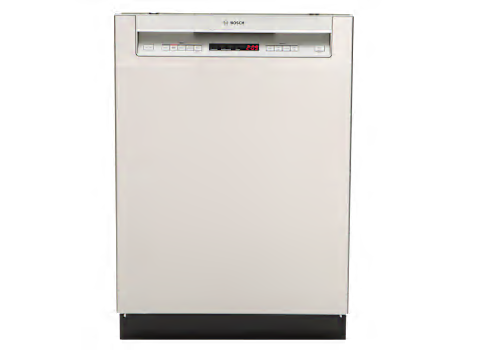CR’s interactive tool leverages product costs, depreciation rates, and survey data to help you make the right choice. Plus, expert advice on what to do next.

By Liam McCabe
Data visualizations by Andy Bergmann
A broken dishwasher might not turn your life upside down like a busted fridge—you can always hand-wash, after all—but it’s still a frustrating hassle. And then there’s the uncertainty about what to do next: Should you replace it or navigate the challenges of getting it fixed?
Our interactive tool can help you figure out whether it’s worth paying a professional to repair your dishwasher or whether you’re better off buying a new one. Below, we’ll also share tips on how to give new life to your dishwasher without the help of a pro—and if necessary, how to dispose of it responsibly and pick a new model that will last.
Our advice is based on the latest data from CR’s exclusive member surveys along with product-specific depreciation rates. The product’s age, the cost of repairs, and the cost of buying new are also taken into account.
Factors to Consider
With dishwashers, the data typically leans toward replacement. They lose their value faster than you might realize, and professional repairs can be surprisingly expensive. The median repair cost is around $142, based on our surveys of more than 125,000 CR members.
The tool provides some general guidance but not the final word on what you ought to do. If you’d prefer to keep your dishwasher out of the dump, even if it costs extra, then you can always consider a repair. (After all, the Environmental Protection Agency reported that in 2018, the most recent data available, 5.3 million tons of waste were generated from large appliances, with 2.1 million tons ending up in a landfill.) And sometimes it’s not so easy to find a replacement that you actually want. In that case, too, you might opt for a repair, even if the tool above suggests a replacement.
DIY vs. Hiring a Pro
Say your dishwasher still works, just not as well as you remember it working in the past. Sometimes your dishwasher just needs some quick maintenance to get back into top shape.
For example, a dip in your dishwasher’s cleaning performance could simply be from a clogged filter, or food and mineral buildup somewhere else in the appliance. Those are easy problems to fix, no tools required. We’ve got plenty of advice on keeping your dishwasher running well.
If the problem seems to be more complex, start by checking to see if you’re entitled to free service under the terms of your product warranty (usually for the first year of ownership) or perhaps under a product recall or class-action settlement.
The first step is to find your dishwasher’s model number. It’s usually printed on a sticker somewhere along the side of the dishwasher door, and it will almost always be a combination of seemingly random numbers and letters. Next, punch that into a Google search with “recall” or “warranty,” and you should get the info you need.
Generally, if your appliance is under warranty, get in touch directly with the manufacturer to make a claim. But some appliance dealers have in-house service teams, so if you bought your dishwasher from one of those retailers, contact them first.
If you aren’t entitled to free service, try to diagnose your dishwasher’s problem on your own. You might learn that you can easily fix it by yourself or at least get a sense of how difficult and expensive the fix might be.
Many appliances have a diagnostic mode. Certain LG and Samsung appliances (including dishwashers), for example, have an easy-to-use self-diagnosis feature that can send troubleshooting instructions to a smartphone app. Most brands have a diagnostic mode meant specifically for repair technicians, but you can often access it yourself with timed button presses. Search for it on Google or YouTube by typing in the brand and model number of your dishwasher along with the words “diagnostic mode.” The most reliable posts generally rise to the top of your search results.
Most dishwasher product manuals (and brand web pages) also have a troubleshooting section that might give you some clues. Customer service might be able to point you to a helpful site or video online, or guide you over the phone or an online chat directly, though some are more helpful than others.
Whatever the problem turns out to be, you’ll probably save more money by fixing it on your own. Repair Clinic is a good place to start because it carries spare parts for loads of dishwashers and has tons of useful tutorials vetted by experienced technicians.
Still, some tasks are better left to the pros, “including pump repair and any electronic controls,” says Larry Ciufo, CR’s head of dishwasher testing. To get an idea of average repair costs in your area, check sites like Angi or HomeAdvisor.
Making Greener Choices
• We compiled tips on how to save more—and waste less—all around the house.
• Repair vs. Replace: Refrigerators, Ranges, Washing Machines, Dryers.
• See our Appliance Brand Reliability Rankings.
• For more eco-friendly ideas, see CR’s Guide to Sustainable Living.
You can search for technicians on Angi and Thumbtack. Of course, it’s always also a good idea to ask friends and neighbors in your area for recommendations. Most independent contractors will work on most appliance brands, but there are exceptions. (Service for Miele appliances can be hard to find, for example.)
You’ll often have to pay a technician just to travel to your home before they can diagnose the problem and offer a quote. This kind of service fee typically costs $50 to $100, according to Home Advisor, and it will usually count toward the price of the repair if you follow through with the job. But if the repair turns out to cost more than you’re willing to pay, then, well, you’ve blown some money that could have gone toward a replacement. So it’s important to do some research before you call a pro, and review the service’s costs and terms carefully before you hire one.
According to our 2021 survey, about 68 percent of CR members who had a malfunctioning dishwasher attempted to repair it. Many of those who didn’t cited the high cost of repair as a key reason they decided not to go through with it.
Those who hired a professional technician generally saw success, but not always. (These figures don’t include people who chose not to follow through with a professional repair, whether it was because they couldn’t find someone to do the work, the necessary parts weren’t available, or some other reason.)
- 73 percent succeeded with the first attempt
- 18 percent succeeded with subsequent attempts
- 9 percent were never able to fix the problem
Finding a Dishwasher That Will Last
If it’s time for a new dishwasher after all, you could try to recycle your old one. But appliance recycling isn’t easily accessible everywhere, and even if you live somewhere with an appliance recycling program, it can be a challenge to get your old machine to the recycling site. Retailers commonly haul away an aged appliance when they deliver and install a new machine, but it’s not always clear what they do with the old one. You can look for a nearby recycling center (by ZIP code) with Earth 911’s search tool. And if you want to make the most environmentally friendly choice when buying your next dishwasher, consider those that earn our Green Choice designation.
Finally, if you’re not sure what a repair would cost (or even exactly how much you paid for your dishwasher), here’s a simplified, big-picture look, based on averages. In general, dishwashers that cost more are worth repairing over a longer period of time, because the cost of a typical repair is a smaller proportion of the value of the dishwasher. In other words, a $140 repair on a low-end dishwasher rarely makes financial sense. You’re better off putting the money toward a new $500 appliance. But for a $1,000 dishwasher, a $140 repair is often worth pursuing for the better part of a decade.
Top-Rated Dishwashers From Reliable Brands
To increase the chance that you’ll end up with a new dishwasher that’s built to last, explore our comprehensive dishwasher ratings, which include more than 100 models. CR members can see the strongest performers from the most reliable dishwasher brands. Below are reviews of five models from three brands with our top predicted reliability rating.
Bosch 300 Series SHEM63W55N

CR’s take: Bosch stood out as one of the most reliable dishwasher brands in our survey of CR members, earning the top rating for both predicted reliability and owner satisfaction. This midrange model from the 300 Series washes well and runs quietly; it dries decently enough, too. It also offers a broad set of useful features, including a stainless steel interior (which is less likely to stain compared with plastic), an adjustable rack, a third rack, and a 1-hour wash-and-dry cycle. It doesn’t have a self-cleaning filter, however.
Ikea Essentiell (80.655.85)

CR’s take: Ikea as a brand earns outstanding scores for predicted reliability and owner satisfaction (just a notch below Bosch). The nicely priced Essentiell is excellent at washing and almost as great at drying. It’s not particularly quiet though—earning a middling score on that test—and its interior is plastic. Still, it has features often associated with pricier machines, such as an adjustable upper rack and a display that shows the remaining time. Hidden controls make for a sleek design. This machine also has a self-cleaning filter, something that the higher-end dishwashers on this list don’t have.
Thermador DWHD760CFP

CR’s take: Thermador earns stellar marks for predicted reliability for its dishwashers (as does Bosch, which is owned by the same parent company). It scores almost as high for owner satisfaction, too. The DWHD760CFP performs nicely across our tests, so you can expect a machine that washes and dries equally well and doesn’t make much noise. It has features you’d expect from an expensive dishwasher, such as a third rack and a stainless-steel interior, plus hidden controls for a streamlined look. Its filter requires manual cleaning, however, but it does have WiFi capabilities.
Consumer Reports is an independent, nonprofit organization that works side by side with consumers to create a fairer, safer, and healthier world. CR does not endorse products or services, and does not accept advertising. Copyright © 2023, Consumer Reports, Inc.
